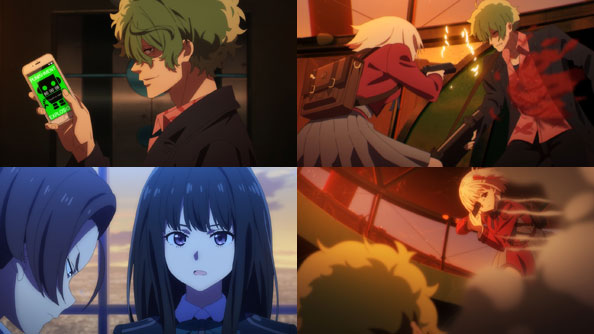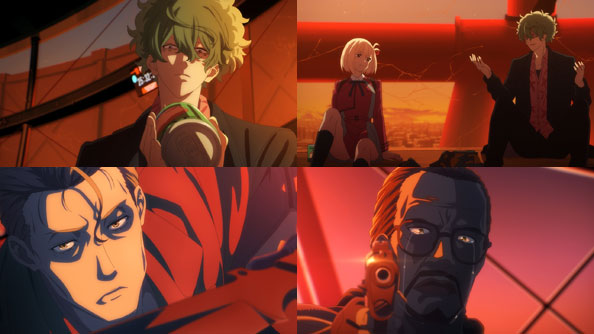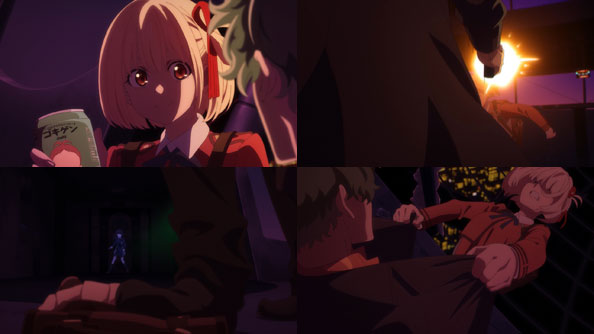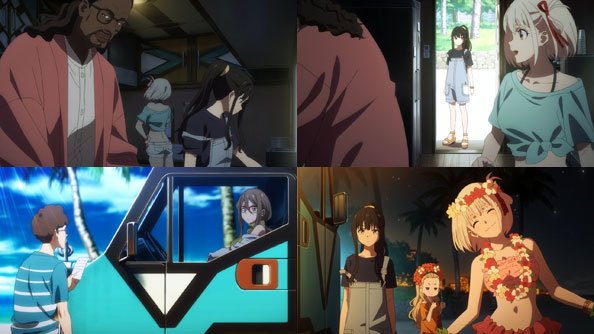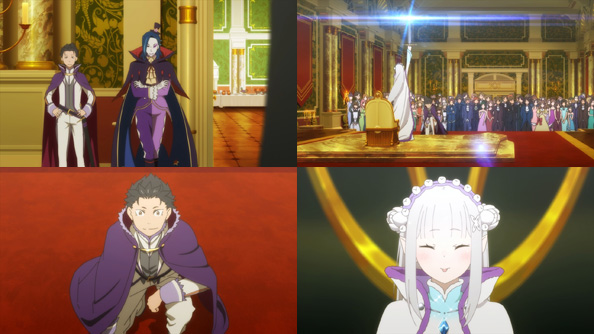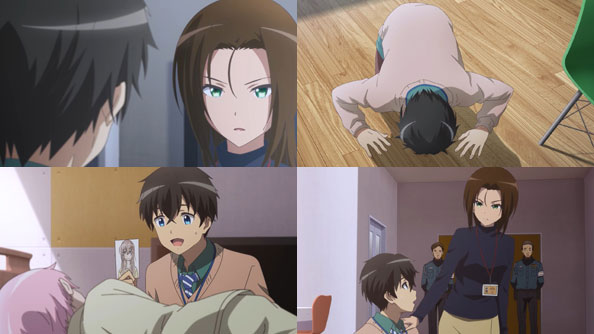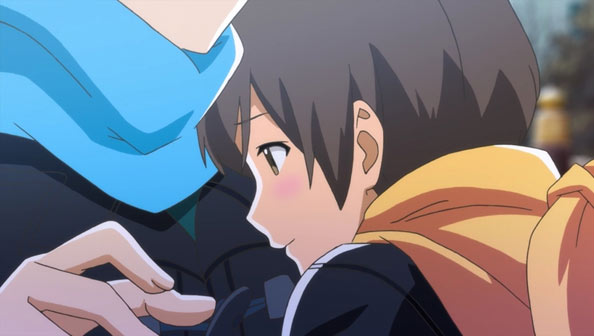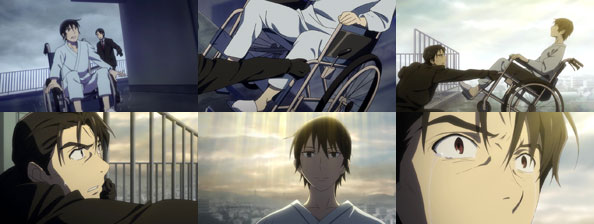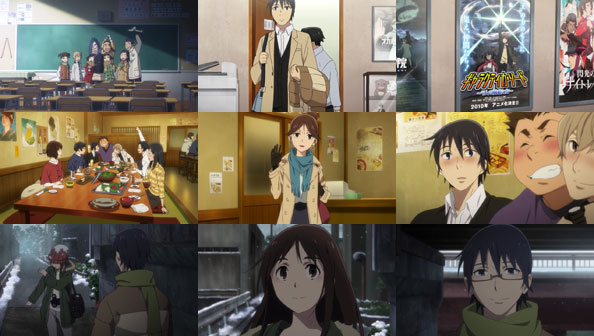
When Miyuki tells Kaguya how he’s been accepted to Harvard and will be gone this time next year, she pretty much turns to stone and then shatters into pieces. But she drags Ai out from whatever she’s doing to update her on where things stand. They both know that the basic plan hasn’t changed—confess to Miyuki—it’s just a matter of how.
Kaguya tries a number of methods, but all are pooh-poohed by Ai in various ways. That is, until Kaguya digs deep, describes all the unique ways she loves the president, including his drive to move forward, and starts to cry as she notes how cruel it would be to ask him not to go overseas. Ai, realizing she went too far, draws Kaguya into a hug and assures her that they’ll get her confession to Miyuki without fail.

In Yuu/Tsubame land, things seem to be going swimmingly. Yuu prepared a hella warm coat for Tsubame to wear when the evening chill came around, and even impresses her with his knowledge of flower language and a red cherry blossom tree in the spot where she wishes to give him an update on her answer to his confession.
Her answer, while not no, is that she doesn’t yet have an answer. That’s fair enough; Tsubame only just realized when Yuu gave her that heart how he truly feels about her, and she’s still getting used to seeing him like that. As for Yuu, he isn’t even aware he did confess with that heart until he watches her perform in the play about the Hoshin legend.

Thanks in part to Ai, Kaguya is poised to have a perfect opportunity to confess to Miyuki: when she’s resplendent in her archer’s garb and lit by the burning flame of her arrow, and Miyuki is completely captivated by her beauty. Unfortunately, Miyuki is nowhere to be found when the time comes to light the campfire!
Instead, shortly after the fire is lit, it suddenly rains cards signed by “Arsene”, the Phantom Thief Chika has been chasing throughout the festival. The jewel from the dragon’s mouth is also missing. Kaguya can’t believe her terrible luck; for all this nonsense to be happening when she’s supposed to be confessing. But the thing is, the Phantom Thief is none other than Miyuki.

When Chika runs off with Erika to further investigate, Kaguya already puts two and two and four together and realizes this is one big scheme by Miyuki, and that she’s going to catch him and then confess to him. That involves sipping canned coffee together, but the machine won’t accept the lowest-denomination bills she has (10,000 yen).
But hey, at least she has the heart trinket to give him, right? Well, no…she managed to lose that when she changed in and out of her archery garb. At the same time, the narrator explains how Miyuki, while initially in a kind of whimsical enthusiasm fugue state, is starting to come to his senses and feel embarrassment for his current situation (and goofy master thief getup).
As Kaguya ascends the clock tower to meet Miyuki, they both find themselves bereft of their usual arsenals of weapons in their long war game of love. There’s nothing left but their feelings, their words, and the months before Miyuki heads to California.
This would make for an infuriatingly frustrating end to the third season…if this were the final episode in its entirety. Thankfully, this is not the end, and as soon as I realized I’d only watched the first of a two-part double episode, I regained my composure and kept watching.

When Kaguya reaches the top, the narrator repeats his spiel from the very first episodes, about how love is war, those in love live in terror, etc. But Miyuki and Kaguya go on that they must convey their feelings for the one they love, even if it means they “lose”, or they’ll never move forward.
While donning his ridiculous top hat, Miyuki tells Kaguya having her beside him for this, his big final culture festival moment, and Kaguya goes through all the things in her head she should say to him out loud. That she wants him to stay by her side forever, and that even if she’s not sure he would ever like a “cold, hateful woman”, but if he confessed to her right then and there, she’d 100% accept it.
Miyuki doesn’t confess with words, but he does confess by unleashing the jewel of the dragon—which turned out to be a weather balloon—with an app, and has it drift over the campfire until it pops, revealing a massive swarm of heart-shaped balloons that float up to their vantage point atop the tower.

He and the narrator recount Miyuki’s efforts for the “Ultra Romantic Campaign” that culminated in this heart balloon blizzard; a plan he first set into motion the same day he applied to Stanford. He planned every last detail, including ensuring Chika, Yuu, and Miko didn’t interfere at the proper time.
Just like Kaguya, Miyuki launches into a self-deprecating inner monologue about how he worked his goddamn tail off to become her equal, and explains that if he overtly confessed or ask her out in words, he’d be confirming the fact they weren’t equals. No, he needed to do something that would make her confess to him.
But what’s most important to Miyuki isn’t that she confess, or that they go out…it’s that they are able to remain together. To that end, he got the principal to agree to write a second letter of recommendation for Kaguya, and atop that tower, as he holds a blue balloon heart and she holds a red one, he asks her to apply to Stanford and go with him to the U.S.
It’s not a confession, but despite what a shock it brings to Kaguya, she’s so happy to hear these words that she agrees on the spot, so quickly that it weird Miyuki out a little. And now that Miyuki has expressed how he feels and what he wants, Kaguya can do the same, and does so with a passionate kiss that is witnessed but notably and mercifully not interrupted by Chika’s Scooby Gang.

In between these stunningly epic scenes of some of the most gratifying payoffs in anime rom-comdom, the rest of the cast get their curtain calls for the season. Nagisa dances with Maki, assuring her that she likes her more than Tsubasa; Kobachi admits to her bae it’s time to stop being so overprotective of Miko; Yuu deems it unkind to steal Tsubame away from her adoring fans and classmates and instead tracks down Miko, shows her footage of the campfire she made happen, and tells her to go enjoy it already.
Later that night, Kaguya recounts her Ultra Romantic evening with the President to Ai in a voice best described as … “giddysmug”. She gleefully describes the kiss as tasting like ketchup (since Miyuki had just eaten a corn dog) and goes on to decribe how she used her tongue during the kiss, which we see made a lasting impact on Miyuki.

Mind you, neither Miyuki nor Kaguya actually verbally confessed … but c’maaaahn. Even these two clueless doofuses cannot deny what they are to one another, and while there’s certainly a lot to think about and plan (including how to get the other to verbally confess to them!), the fact that their future is secure together is a great weight lifted from their shoulders.
Student Council antics continue as usual, with Chika coming up with a game that will start some shit, and Yuu and Miko sparring like siblings. Kaguya and Miyuki look on with pride and contentment, the Miyuki’s desk hiding the fact that they’re holding hands. It was definitely touch-and-go throughout this stressful closing culture festival arc, but Love is War nailed the landing, and I never should have doubted it would.
If a fourth season comes around—and apparently there’s an enormous amount of source material left to adapt—it will be icing on an already perfect cake. But when we’re talking about icing this well made, there’s no such thing as too much. Keep making this show until these dweebs are old and gray with grandchildren running around in California; I wouldn’t need any other anime to sustain me!

RABUJOI WORLD HERITAGE LIST























